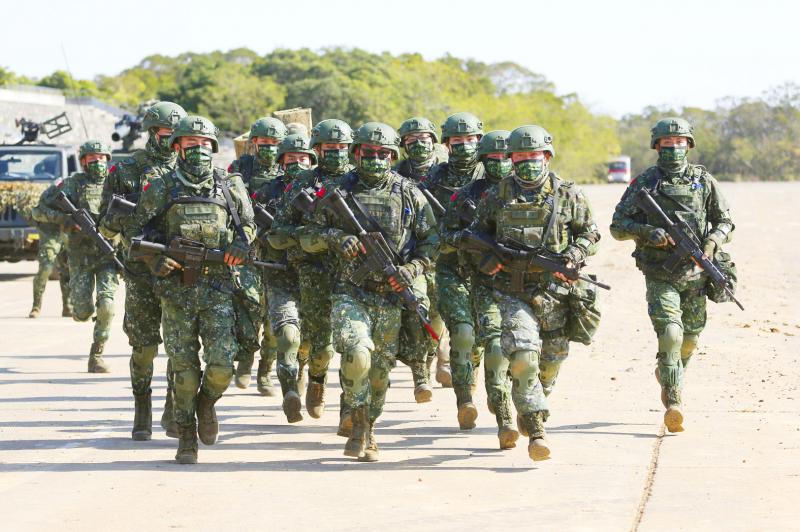The duration of mandatory military service in Taiwan should be tripled, former minister of national defense Michael Tsai (蔡明憲) on Friday.
Tsai made the remarks after Minister of National Defense Chiu Kuo-cheng (邱國正) earlier on Friday told lawmakers at the Legislative Yuan in Taipei that he is mulling the issue.
Taiwanese men are required to undergo four months of military training.

Photo: Chiang Ying-ying, AP
However, the duration of the service should be increased to one year, Tsai said, adding that this would allow the minimum amount of training so reservists would be effective if called upon to fight.
The mandatory service is not an efficient use of time in its current form, as four months of training is barely enough to acclimate conscripts to military life, he said.
It takes six additional months to learn the basics of military operations and weapons handling, he said.
Although military service is unpopular among young voters, longer service terms are necessary for Taiwan to protect itself against the threat of Chinese aggression, he said.
Israel, South Korea and Singapore have longer mandatory military conscription terms to augment their defensive capabilities, Tsai said, adding that serving in the armed forces is a duty stipulated by the Constitution.
“If President Tsai Ing-wen’s (蔡英文) administration puts votes before the defense of the nation, then Taiwan faces a precarious future,” he said.
Retired army major general Richard Hu (胡瑞舟), who is a researcher at the Taiwan Center for Security Studies, said that alternative service — where men spend their mandatory military service in areas other than regular training — should be rolled back to enlarge the armed forces.
As there is an escalating threat to national security from China, increasing the number of conscripts would bolster the army and create a deeper reservoir of reserve forces in the event of war, Hu said.
However, the military must also examine the poor training regimen that had been established, he said, adding that more of the scientific methodologies and experience from other modern militaries could be used in Taiwan.
Improving the quality of military training programs should take precedence over lengthening mandatory service, he said.

The brilliant blue waters, thick foliage and bucolic atmosphere on this seemingly idyllic archipelago deep in the Pacific Ocean belie the key role it now plays in a titanic geopolitical struggle. Palau is again on the front line as China, and the US and its allies prepare their forces in an intensifying contest for control over the Asia-Pacific region. The democratic nation of just 17,000 people hosts US-controlled airstrips and soon-to-be-completed radar installations that the US military describes as “critical” to monitoring vast swathes of water and airspace. It is also a key piece of the second island chain, a string of

A magnitude 5.9 earthquake that struck about 33km off the coast of Hualien City was the "main shock" in a series of quakes in the area, with aftershocks expected over the next three days, the Central Weather Administration (CWA) said yesterday. Prior to the magnitude 5.9 quake shaking most of Taiwan at 6:53pm yesterday, six other earthquakes stronger than a magnitude of 4, starting with a magnitude 5.5 quake at 6:09pm, occurred in the area. CWA Seismological Center Director Wu Chien-fu (吳健富) confirmed that the quakes were all part of the same series and that the magnitude 5.5 temblor was

The Central Weather Administration has issued a heat alert for southeastern Taiwan, warning of temperatures as high as 36°C today, while alerting some coastal areas of strong winds later in the day. Kaohsiung’s Neimen District (內門) and Pingtung County’s Neipu Township (內埔) are under an orange heat alert, which warns of temperatures as high as 36°C for three consecutive days, the CWA said, citing southwest winds. The heat would also extend to Tainan’s Nansi (楠西) and Yujing (玉井) districts, as well as Pingtung’s Gaoshu (高樹), Yanpu (鹽埔) and Majia (瑪家) townships, it said, forecasting highs of up to 36°C in those areas

IN FULL SWING: Recall drives against lawmakers in Hualien, Taoyuan and Hsinchu have reached the second-stage threshold, the campaigners said Campaigners in a recall petition against Chinese Nationalist Party (KMT) Legislator Yen Kuan-heng (顏寬恒) in Taichung yesterday said their signature target is within sight, and that they need a big push to collect about 500 more signatures from locals to reach the second-stage threshold. Recall campaigns against KMT lawmakers Johnny Chiang (江啟臣), Yang Chiung-ying (楊瓊瓔) and Lo Ting-wei (羅廷瑋) are also close to the 10 percent threshold, and campaigners are mounting a final push this week. They need about 800 signatures against Chiang and about 2,000 against Yang. Campaigners seeking to recall Lo said they had reached the threshold figure over the